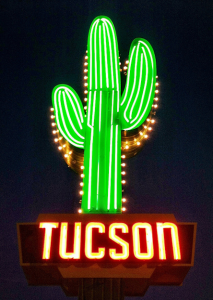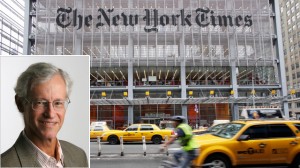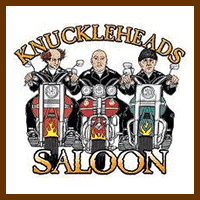 Subject for today; institutions that are going away…
Subject for today; institutions that are going away…
I’d already been giving this some thought lately while driving cross-country to Tucson and back from Kansas City. In many ways the trip served as a refresher course on how much things have changed around the country. For better in some cases and for worse in others. Obviously, right?
Take The Big Texan restaurant in Amarillo. It’s run by former Savoy Grill main man Danny Lee and his family and is the home of the 72-ounce steak. A slab of beef that if you polish it (and all the trimmings) off in an hour, is free. And it’s got an affordable, kick ass vibe that includes a geriatric, roaming cowpoke band that will kick out a chorus of ‘Goin to Kansas City’ at your table for a couple buck tip. Nice.
And so, that’s all good.
 Meanwhile back in Tucson, where I went to school and lived for four years, dentists from Topeka and retirees from everywhere have been mindlessly moving there for the weather and generating a really awful case of unplanned sprawl while putting a serious hurt on the city’s aquifer and making a bleak outlook for Tucson’s future water needs.
Meanwhile back in Tucson, where I went to school and lived for four years, dentists from Topeka and retirees from everywhere have been mindlessly moving there for the weather and generating a really awful case of unplanned sprawl while putting a serious hurt on the city’s aquifer and making a bleak outlook for Tucson’s future water needs.
That’s a bad thing.
Which brings me to Douglas A. McIntyre’s sad, startling story, “Nine Great American Companies That Will Never Recover.”
It ran on 24/7 Wall Street and was picked up by a number of news sites probably because when you scan the names on McIntyre’s hit list it’s kind of a shocker, especially for Kansas Citians.
 Starting with the fact that No. 4 on the list is KC’s Sprint Nextel Corp. That’s not exactly a big surprise but it’s sobering to actually read it.
Starting with the fact that No. 4 on the list is KC’s Sprint Nextel Corp. That’s not exactly a big surprise but it’s sobering to actually read it.
“Sprint finally posted some reasonably good results recently,” McIntyre begins. “However, these could not mask the fact that the No. 3 wireless carrier is too small to ever gain any ground on AT&T Inc. and Verizon Wireless.
“Sprint’s revenue rose rapidly from 2002 to 2006. Over the period, sales moved from $15.2 billion to $41 billion, aided by the buyout of Nextel at the end of 2004. Sprint paid $35 billion for Nextel, and the decision turned out to be a disaster. The Sprint network ran on a different platform from Nextel’s. Customers left the combined company. Sprint made the MSN “Customer Service Hall of Shame” several times, most recently in 2010. Sprint’s customer service ratings have improved significantly since then, but the damage has been done.”
So pay your respects while you can I guess and think about where you want to reinvest what’s left of that Sprint stock you bought back when Bill Esrey ran the company and did that Rolling Stones tour deal.
*******
 Numero Uno on McIntyre’s not-long-for-this-earth list is J.C.Penney, a company with strong ties to KC. That shouldn’t come as much of a surprise except for the fact that Penny kinda modernized it’s business model several years back after Montgomery Wards bit the dust and Sears continued its long, sad slide.
Numero Uno on McIntyre’s not-long-for-this-earth list is J.C.Penney, a company with strong ties to KC. That shouldn’t come as much of a surprise except for the fact that Penny kinda modernized it’s business model several years back after Montgomery Wards bit the dust and Sears continued its long, sad slide.
The Kansas City area stands to take a hit given Penney’s powerful presence and history here. Take its massive new store near 135th and Metcalf. It’s one of the very few retail anchors to even open in the troubled Corbin Park shopping development.
“J.C. Penney, founded in 1913, counted itself among the primary retailers and catalog companies in the US for decades,” McIntyre writes, citing revenue and stock price slides of monumental proportions in recent years.
The problem being that everyone from Target and Macy’s to Wal Mart and Costco are eating what’s left of Penney’s lunch.
It may not be over for Penney until the fat lady sings, but she’s already shopping elsewhere. Don’t forget to check out the Sephora section there next time you’re there though. At least the company’s going down in style.
*******
Number two on McIntyre’s fading fast list, The New York Times, actually came as a bit of a shock to me.
 That despite all my critiquing of print pubs like the Kansas City Star and the Pitch. But the fact is I really have no dog in the imaginary war some local bloggers are waging against the so-called dead tree news industry.
That despite all my critiquing of print pubs like the Kansas City Star and the Pitch. But the fact is I really have no dog in the imaginary war some local bloggers are waging against the so-called dead tree news industry.
After all, without major media like the Star who would people like Tony and myself have to pick on? Somebody has to originate major news, not just link to them and make snarky comments.
I digress.
The New York Times is in trouble, McIntyre says.
“The New York Times is, and has been for decades, the premier daily newspaper company in the US,” he begins. “But the company has been shrinking rapidly. Ten years ago, The New York Times Company made $300 million on revenue of $3.1 billion. Last year it lost $40 million on revenue of $2.3 billion. The New York Times did not move online fast enough to offset the rapid erosion of print advertising. Its tardiness allowed it to be challenged on the Internet by properties like The Huffington Post, Google News, and the news, sports, and financial properties of portals MSN, AOL, and Yahoo!.”
No wonder former Star publisher Art Brisbane is bailing from the Times next month. I’m joking.
There’s more.
“Its market cap and cash balance are too low to allow it to more aggressively move to the Internet or buy large online properties,” McIntyre continues.
And now another nugget that doesn’t bode well for KC:
“The (newsprint) industry is in the midst of another wave of job cuts. The Times has not been able to show significant top-line growth, even with its digital subscription efforts. Print is in too much of a shambles for the company to shore itself up in the digital world.”
That’s not good news, ladies and gentlemen. Not good at all. The Star has been able to limp along for the past year or so with job furloughs – unpaid vacations – for staffers. And while the economy will hopefully improve at some point, the handwriting’s on the wall that the days of newspapers supporting large staffs of reporters are o-v-e-r.
*******
 Number 3 on McIntyre’s list is newcomer Groupon.
Number 3 on McIntyre’s list is newcomer Groupon.
As I reminded recently, I was among the first to sing Groupon’s praises when they hit town three years back.
Its business model made sense. Trouble is, anybody and everybody can play and that’s exactly what’s happened. Groupon’s getting eaten alive by competition from virtually everywhere.
It’s no accident that Eric Vianello’s queer-sounding email deal company Muncharoo sold out to Crowd Savings recently. There are simply too many players and consumers are getting burned out after years of being bombarded by discount deals.
“Groupon is an unlikely candidate for a list of companies that have their best years behind them, “McIntyre writes. “One reason Groupon belongs on this list is its stock price has fallen by well over 70% since its November 2011 IPO. Groupon’s primary problem is that the online coupon business, in which it was the major pioneer, is a commodity business now. It has not been terribly difficult for Amazon and other large retailers like Wal Mart to enter the sector.”
*******
 Another soon-to-be dead company is Barnes & Noble, not a big surprise to anybody who followed the collapse of rival book behemoth Borders last year.
Another soon-to-be dead company is Barnes & Noble, not a big surprise to anybody who followed the collapse of rival book behemoth Borders last year.
“The cause of Barnes & Noble’s downfall can be described in a word — Amazon,” McIntyre writes. “In 2002, Barnes & Noble made $109 million on sales of $4.9 billion. That same year, Amazon lost $149 million on revenue of $3.9 billion. Fast-forward to 2011 when Amazon’s revenue reached $48.1 billion and it earned $631 million. Barnes & Noble lost $69 million on $7.1 billion last year.”
The company’s unfortunate bottom line: “Barnes & Noble is hopelessly outgunned online, and the retail book business has leveled off.”
 For the record, Dell Computer, Bank of America, Advanced Micro Devices and the social network game company Zynga round out the companies McIntyre pegged to bite the dust. And I’m sure we can all think of others not long for this earth in these changing times.
For the record, Dell Computer, Bank of America, Advanced Micro Devices and the social network game company Zynga round out the companies McIntyre pegged to bite the dust. And I’m sure we can all think of others not long for this earth in these changing times.
But you know, we still have Winstead’s, Gates, the Plaza, Rainy Day Books and birdies. And despite this year’s drought, our aquifer is in far better shape than Tucson’s.
At least I think it is.










To quote the Earl of Sphinctershire, Sir Gordon Mansawsij, “No shit!”. Amazing how people have made a career out of stating the obvious and now quoting and repackaging same for our further enjoyment.
RIP Sprint, you made some people some good money and employed a good population of the KC area at one time. You shall not be missed though.
Hmmmmm so riding that far and long in a Fiat makes you write stories like this?
Bring Lefty back to the helm so he can run things.
Lefty isn’t going anywhere (that I know of). Glad to hear you enjoyed his show!
Newsflash: the western third of the U.S. is a DESERT…….whether people move “mindlessly” or with careful forethought, there ain’t enough water to support the growth in the Southwest. The Colorado River only has so much to give. Cities such as Tucson, Phoenix, Las Vegas, and L.A. will have to fight it out for the limited water resources.
They were probably lying, but the manager at Barnes & Noble told me the uptick in business was pretty dramatic when Borders went out.
In addition, the folks at Half Price Books told me the same thing.
Old folks like me still like to have a book with real pages. I have a Kindle and I like it, but I still really enjoy going to Barnes & Nobel.
Is there anything we won’t do on line?
Old farts like me, will have to buy that new fangled “Liquid Luddite Lube” and shove a 16 pin connector up our asses to take virtual shits in the new Matrix Metropolis.
Sheesh…
Free Ted Kaczynski!!
I swear I can’t ever get on here. I am over “moderated”.
rkcal, thank you very much, brings us even closer to reality and what we really need to be talking about. In a word – overpopulation … more and more people putting more and more demands on the limited resources of the planet. The Desert Southwest is rapidly spreading to other parts of the country. Speaking of the end of the world, I know of a couple of women who are earnestly praying for it. Perhaps they’re on to something here, as we may be fast approaching the point where things are so bad – famine, pestilence, wars, etc. – that the living will envy the dead. Like that old song suggests, “it’s later than you think.”
It’s common sense- don’t live in the middle of the damn desert unless you have access to a decent water supply that you don’t have to pipe from 500 or more miles away. It is unsustainable living (SoCo and Phoenix come readily to mind).